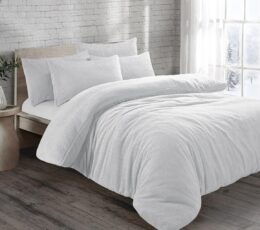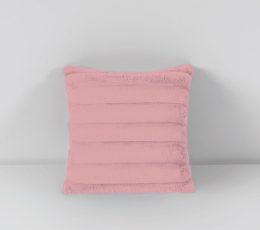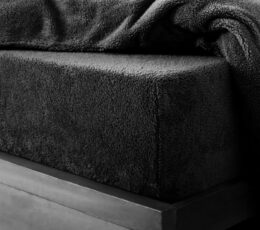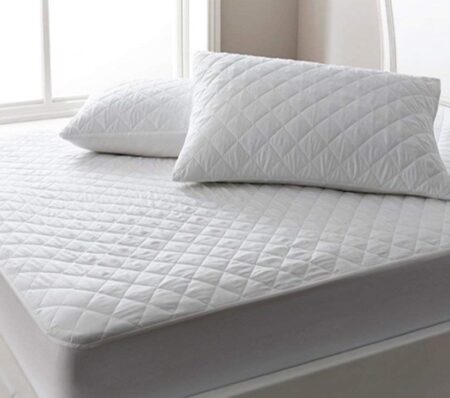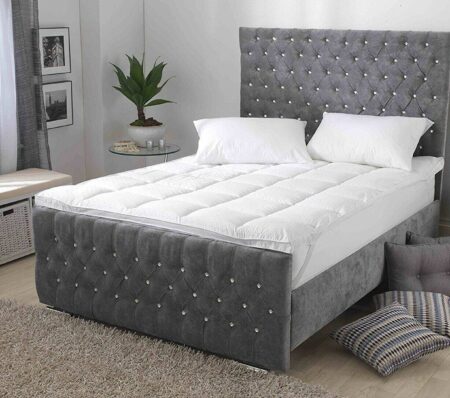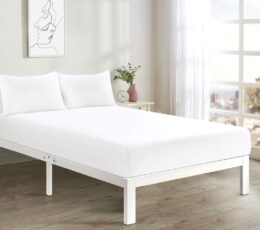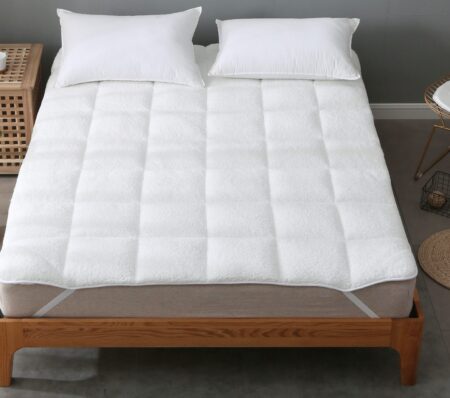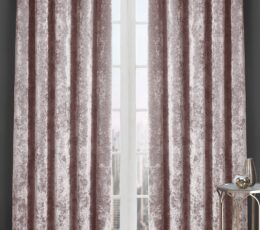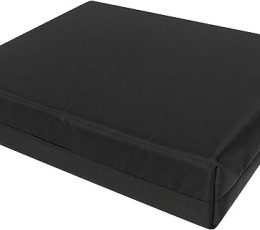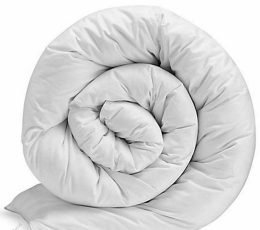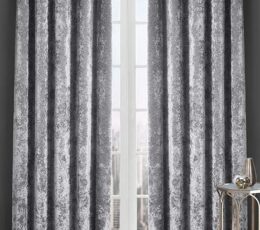Whenever we sleep, we think that sleep is just about how we rest in bed rather than relaxing our body by making peace in our mind and body. But This is not just the case while we are sleeping; the surroundings mainly matter to improve the quality of the sleep that provides the best comfort to our body; for that, we suggest investing in quality bedding like thick pillows and many other products.
Pillows are often an overlooked aspect of a good night’s sleep, yet they play a crucial role in ensuring comfort and proper alignment of the spine. Among the myriad of hotel collection pillows choices available in the market, determining the ideal thickness of pillow can be challenging. One of the best ways to achieve this is to get a quality pillow, so for that, here we are going to discuss the importance of choosing the perfect pillow with thickness.

Why Pillows are Crucial for Sleep:
Pillows are often underestimated in their importance for a good night’s sleep, yet they play a fundamental role in ensuring comfort and supporting proper spinal alignment. Before going any further we recommend to understand how to choose the best comfort pillow. Here’s why pillows are crucial for sleep:
- Spinal Alignment: A primary function of pillows is to support the spine’s natural curvature, especially in the neck and upper back regions. When the spine is aligned correctly, it reduces strain on muscles and ligaments, minimizing discomfort and preventing long-term issues like chronic neck or back pain. For this the neck pillow is the perfect choice.
- Pressure Relief: Pillows cushion the head and neck, distributing weight evenly and reducing pressure on specific areas. This helps alleviate tension in muscles and blood vessels, promoting relaxation and preventing the development of pressure ulcers or soreness.
- Comfort and Relaxation: The right pillow can significantly enhance comfort during sleep, allowing individuals to relax more fully and fall asleep faster. Comfort is subjective, but pillows that conform to personal preferences can contribute to a deeper and more restorative sleep experience.
- Support for Different Sleeping Positions: People have varying sleeping preferences, whether they sleep on their back, side, or stomach. Pillows are designed to accommodate these preferences by providing adequate support and maintaining proper alignment, regardless of the sleeping position.
- Temperature Regulation: Certain pillow materials, such as memory foam or cooling gel-infused foams, can help regulate body temperature by dispersing heat and promoting airflow. This prevents overheating during sleep, ensuring a more comfortable and undisturbed rest.
In essence, pillows are essential for sleep because they support spinal alignment, relieve pressure points, enhance comfort, accommodate different sleeping positions, and contribute to temperature regulation. Choosing the right pillow tailored to individual needs is crucial for optimizing sleep quality and overall well-being.
What Makes the Perfect Pillow?
The perfect pillow is subjective and depends on individual preferences, body type, and sleep habits. However, several key factors contribute to its quality:
- Support: A good pillow should provide adequate support to the head, neck, and shoulders, maintaining proper spine alignment. The level of support can vary depending on the pillow’s firmness and loft (height).
- Material: Pillows come in various materials, including memory foam, latex, down, and polyester fiberfill. Each material offers different levels of support, breathability, and durability, so choosing one that suits personal preferences and needs is essential. Amoung which the duck feather pillows are the best choice for the natural sleeper.
- Size and Shape: The size and shape of a pillow can affect its comfort and suitability for different sleeping positions. For example, contour pillows are designed to cradle the head and neck, while traditional pillows may offer more versatility.
- Durability: A high-quality pillow should maintain its shape and supportiveness over time, even with regular use. Durable materials and construction ensure that the pillow remains comfortable and supportive for an extended period.
- Hypoallergenic Properties: For individuals with allergies or sensitivities, hypoallergenic pillows made from natural or synthetic materials can help minimize exposure to allergens like dust mites, mould, and pet dander. The Hospital pillow are one of the pillow with this feature.
The perfect pillow combines optimal support, suitable materials, appropriate size and shape, durability, and hypoallergenic properties to meet individual sleep needs and preferences. The hotel pillow are mainly selected while following the above discussed matters to perfect comfortable pillow and solves the query of what pillows do hotels use.

Why it is So Important to Choose the Right Pillow:
Well, as we understand, it is important to choose the right pillow, but it is also essential to understand the reason why it is so important to choose the right pillow. The right pillow mainly cosulted by the pillow guide to match the user every requirement. So, Here below, we see some of the most highlighted. Features to why choose the right pillow:
- Comfort and Sleep Quality: A pillow that matches personal preferences and sleeping habits enhances comfort and promotes better sleep quality. Discomfort from an ill-fitting pillow can lead to restlessness, frequent waking, and overall poor sleep.
- Prevention of Pain and Discomfort: Using the wrong pillow can contribute to neck pain, headaches, stiffness, and discomfort upon waking. Selecting a pillow that provides proper support and alignment helps prevent these issues and promotes overall spinal health. For This you can consider to get the gel pillow that gives the firm support to your neck and overall body.
- Optimal Sleep Posture: The right pillow supports healthy sleep posture by aligning the spine and maintaining a neutral position for the head and neck. This reduces strain on muscles and ligaments, minimizing the risk of sleep-related injuries and promoting long-term musculoskeletal health.
- Allergy Management: For individuals with allergies or asthma, choosing a hypoallergenic pillow can help minimize exposure to allergens and improve respiratory health during sleep. This is particularly important for those sensitive to dust mites, pollen, pet dander, or other common allergens.
- Long-Term Comfort and Investment: Investing in a high-quality pillow tailored to individual needs is an investment in long-term comfort and well-being. A well-chosen pillow retains its supportive properties, ensuring continued comfort and restful sleep for years.
Which Thickness is Best for You?
The ideal thickness of a pillow depends on various factors, including personal preference, sleeping position, and anatomical considerations. Here’s a breakdown of different pillow thicknesses and their suitability for various sleeping positions:
Thin Pillow
Thin pillows are usually recommended for stomach sleepers. Sleeping on your stomach typically requires minimal elevation of the head and neck to maintain spinal alignment. A thin pillow helps prevent excessive strain on the neck by keeping it in a more neutral position. Whenever we are selecting the thin pillows we recommend to go with more quality pillow instead of cheap pillows that lasts limited.
Medium Pillow
Medium-thickness pillows are versatile and suitable for most sleeping positions, including back and side sleeping. Back sleepers may find medium pillows supportive enough to maintain proper alignment of the head, neck, and spine. Side sleepers may need a slightly thicker pillow to fill the space between the ear and the shoulder, providing adequate support for the head and neck.
Thick Pillow
Thick pillows are generally recommended for side sleepers who need extra loft to keep their head and neck aligned with the spine. The thickness of the pillow should be enough to fill the space between the shoulder and the ear, ensuring proper support and alignment. However, it’s essential to avoid pillows that are too thick, as they can cause the neck to bend unnaturally, leading to discomfort and stiffness.

Factors to Consider When Choosing Thickness Of PIllow:
- Sleeping Position: Your preferred sleeping position plays a crucial role in determining the ideal thickness of your pillow. Consider whether you primarily sleep on your back, side, or stomach. Follow our guide to select the best night sleep position for the restful night.
- Neck Support: The pillow should adequately support the natural curve of your neck, regardless of its thickness. Proper support helps alleviate strain on the neck muscles and promotes spinal alignment.
- Mattress Firmness: The firmness of your mattress can also influence the thickness of your pillow. A softer mattress may require a thinner pillow to prevent the head from sinking too deeply, while a firmer mattress may necessitate a thicker pillow for added support. The Firmness mainly depends on the cushion filling that makes it either more comfortable or more thick base on your requirement.
- Personal Preference: Ultimately, your personal comfort preferences should guide your choice of pillow thickness. Experiment with different options to find the thickness that feels most comfortable and supportive for you.
Pillow Maintenance Tips:
Proper maintenance not only prolongs the lifespan of your pillow but also ensures a hygienic sleeping environment. Here are some essential tips for maintaining your pillow:
- Fluffing your pillow regularly helps redistribute the filling and maintain its loft. This prevents clumping and ensures consistent support and comfort.
- Follow the manufacturer’s instructions to clean your pillow effectively. Most pillows can be machine-washed and dried, but some may require special care. A pillow protector or pillowcase can also help extend its cleanliness between washes.
- For minor stains or spills, spot-clean your pillow using a mild detergent and warm water. Avoid soaking the pillow, as excess moisture can lead to mould or mildew growth.
- Periodically expose your pillow to sunlight to help eliminate moisture and odours. Sunlight has natural antibacterial properties that can freshen your pillow and inhibit microbial growth.
- Replace your pillow every 1-2 years or when it starts losing shape and supportiveness. Over time, pillows accumulate dust mites, allergens, and sweat, affecting sleep quality and hygiene.
- Invest in pillow protectors to shield your pillow from stains, dust mites, and allergens. Wash the protectors regularly to maintain cleanliness and prolong the lifespan of your pillow. While in depth we recommend to follow the essential pillow care tips to make sure that the thickness of the pillow remains with its quality.
FAQs
What thickness of pillow is best for side sleepers?
Side sleepers typically benefit from thicker pillows to provide adequate support and maintain proper head, neck, and spine alignment.
Is a thin pillow better for stomach sleepers?
Yes, stomach sleepers often find thinner pillows more comfortable as they help prevent strain on the neck and maintain a more neutral spine position.
What thickness of pillow is recommended for back sleepers?
Back sleepers generally prefer medium-thickness pillows that offer enough support to align the head and neck without elevating them too high.
How do I know if my pillow is too thick?
If your pillow causes your head to tilt upward or downward, resulting in neck strain or discomfort, it may be too thick for your sleeping position.
Can the thickness of a pillow affect snoring?
Yes, using a too thick pillow can restrict airflow and contribute to snoring. Opting for a thinner pillow may help alleviate this issue by keeping the airway more open.
Are adjustable pillows a good option for finding the right thickness?
Yes, adjustable pillows with removable inserts or customizable loft options allow users to tailor the thickness to their preference, making them suitable for a wide range of sleepers.
Does body size affect the ideal thickness of a pillow?
Individuals with larger frames may find thicker pillows more comfortable, while those with smaller frames may prefer thinner pillows to maintain proper alignment.
Can the firmness of a pillow affect its perceived thickness?
Yes, firmer pillows may feel thicker due to less compression, while softer pillows may compress more and feel thinner, regardless of their actual loft.
How do I determine the right pillow thickness if I switch sleeping positions frequently?
Opting for a medium-thickness pillow that provides a balance of support and comfort can accommodate various sleeping positions without compromising spinal alignment.
Are there any health benefits to using the correct thickness pillow?
Yes, using the right pillow thickness promotes proper spinal alignment, reduces pressure points, and enhances overall sleep quality, improving physical health and well-being.
In conclusion, selecting the best thickness pillow is a personal decision influenced by various factors such as sleep position, body type, and preferences. By understanding the importance of pillows for sleep quality, considering the key features of the perfect pillow, and choosing the right thickness, you can enhance comfort, promote proper spinal alignment, and enjoy a restful night’s sleep.












